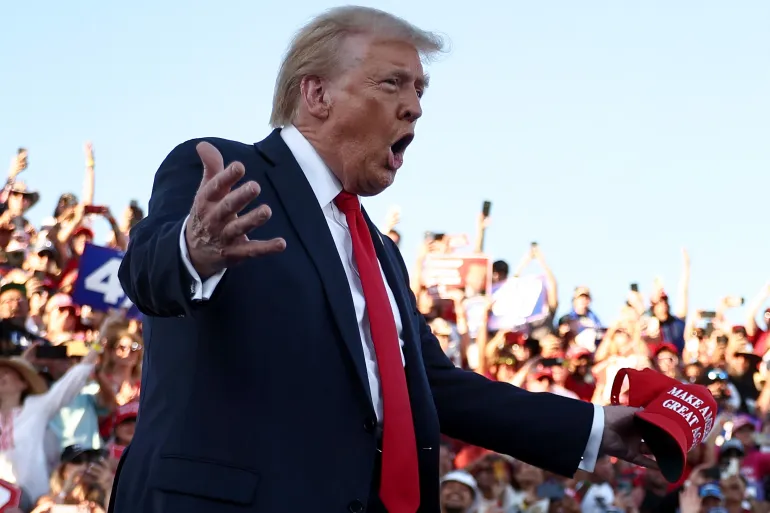Washington, USA – December 11, 2024
In a bold statement signaling his commitment to transforming the U.S. economic landscape, President-elect Donald Trump has promised to fast-track regulatory approvals for investors committing $1 billion or more to projects within the United States. This move comes as part of his broader strategy to attract significant foreign and domestic investment and to address long-standing challenges faced by investors under current regulatory frameworks.
A Vision for Economic Growth
Speaking on his social media platform, Truth Social, Trump announced on Tuesday:
“Anyone or any company investing $1 billion or more in the United States will receive fast-track approvals and permits, including, but not limited to, all environmental approvals. Get ready to take off!!!”

The announcement reflects Trump’s strategy to encourage large-scale investments by streamlining regulatory processes, a departure from traditional incentives like tax breaks and subsidies emphasized during the Biden administration.
Regulatory Overhaul for Major Investments
Trump’s plan targets large investors, proposing a framework that simplifies the bureaucratic process for approvals related to environmental standards, infrastructure, and other essential permits. While he refrained from providing specifics about the implementation process or which sectors would benefit most, the proposal aims to eliminate delays that have historically hindered significant investment projects.
Broader Tax and Policy Initiatives
The President-elect also reiterated his intention to reduce the corporate tax rate from 21% to 15% for businesses investing in the U.S., further signaling his pro-business agenda. The move is expected to bolster local manufacturing and counteract economic policies from the previous administration.
These proposals, if implemented, could have far-reaching impacts, especially in sectors like energy, infrastructure, and technology. Trump’s plans align with his campaign promise to “bring back American jobs” and make the U.S. an attractive destination for high-value investment.
Backing from Industry Leaders
The announcement garnered positive reactions from key industry players, including billionaire entrepreneur Elon Musk, who praised the plan on his social media platform, X (formerly Twitter):
“This is fantastic!”
Musk, a staunch supporter of deregulation, has been appointed by Trump to spearhead federal spending reductions, indicating a shared vision for a leaner government and enhanced economic competitiveness.
Environmental and Political Implications
While Trump’s proposal has been met with enthusiasm by pro-business advocates, it has also sparked concerns among environmentalists. Critics argue that fast-tracking environmental approvals could compromise efforts to protect ecosystems and mitigate climate change.
Proponents of clean energy have expressed cautious support, emphasizing the importance of striking a balance between regulatory flexibility and sustainability. Conversely, traditional energy sectors, including oil and gas, view the plan as a lifeline to accelerate pipeline construction and other infrastructure developments.
A Controversial Investment Threshold
One of the most debated aspects of Trump’s proposal is the $1 billion minimum investment requirement for fast-tracked approvals. Analysts suggest that this threshold could exclude small and medium-sized enterprises (SMEs) from benefiting, potentially widening the gap between large corporations and smaller businesses.
A Shift from Biden’s Industrial Policy
Trump’s announcement highlights a stark departure from the Biden administration’s approach, which relied heavily on tax credits for clean energy and infrastructure projects. Biden’s policies, while aimed at addressing climate change, faced criticism for regulatory hurdles that delayed project implementation.
Throughout Biden’s tenure, lawmakers and industry leaders frequently voiced concerns about the slow pace of regulatory approvals, which impacted everything from semiconductor manufacturing to clean energy infrastructure. Trump’s pledge to streamline processes directly addresses these challenges, albeit with potential trade-offs.
International and Domestic Repercussions
Trump’s proposed 20% tariff on all imports further complements his investment incentives, reinforcing his “America First” economic policy. However, critics warn that such tariffs could spark trade tensions, disrupt supply chains, and increase consumer prices.
Moreover, the potential rollback of clean energy tax credits could undermine the U.S.’s position as a leader in renewable energy innovation, affecting long-term climate goals.
Strategic Implications for Key Sectors
Energy and Infrastructure
The energy sector is poised to benefit significantly from Trump’s proposed deregulation. By reducing barriers for oil and gas exploration and expediting pipeline approvals, the administration aims to revitalize domestic energy production. However, environmental groups argue that such measures could lead to increased greenhouse gas emissions and ecological damage.
Technology and Manufacturing
For the technology sector, particularly semiconductor manufacturing, expedited approvals could accelerate the establishment of production facilities, enhancing supply chain resilience. The manufacturing industry, which has long struggled with regulatory bottlenecks, is expected to witness a surge in new projects, creating jobs and boosting innovation.
Real Estate and Urban Development
Large-scale real estate developments and urban infrastructure projects stand to gain from streamlined approvals. This could include high-speed rail systems, affordable housing initiatives, and urban renewal programs, aligning with Trump’s vision of modernizing American cities.
Public and Political Response
The proposal has elicited mixed reactions across the political spectrum. While Republicans largely support the plan as a pro-growth initiative, Democrats and environmentalists remain skeptical, citing concerns about regulatory rollbacks and their potential impact on public health and environmental conservation.
The Road Ahead
As Trump prepares to take office next month, the business community eagerly awaits further details about his economic and regulatory agenda. While the promise of expedited approvals is a welcome development for large-scale investors, its implementation will require careful balancing of economic priorities, environmental sustainability, and political consensus.




